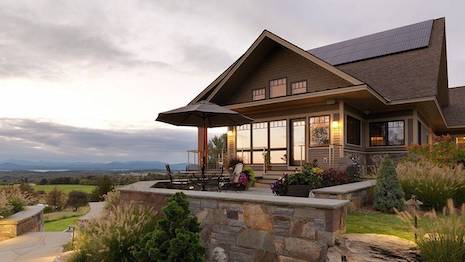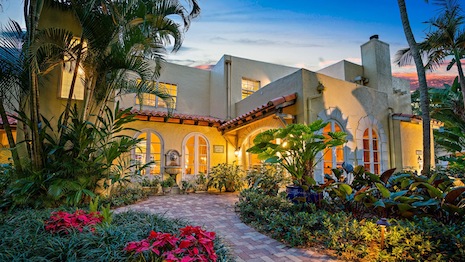 The option of a cheaper ‘green’ mortgage would persuade 22 percent of buyers to improve the energy efficiency of their home. Image credit: Knight Frank
The option of a cheaper ‘green’ mortgage would persuade 22 percent of buyers to improve the energy efficiency of their home. Image credit: Knight Frank As health, well being and sustainable efforts are top of mind for home buyers, the need for energy efficient homes is growing.
According to Knight Frank’s 2021 Global Buyer Survey, nearly a third of buyers (28 percent) say environment regulation affecting the value of their home would influence their decision to buy. The firm analyzed how its clients’ priorities, motivations and attitudes are evolving as the COVID-19 pandemic continues to shape the real estate market.
The survey was conducted between June 10 and July 22. The findings represent the views of more than 900 Knight Frank clients located across 49 countries and territories.
Key findings
The report found that 84 percent of home buyers said the energy efficiency of a future home is important (42 percent) to them but when asked what would motivate them to buy an energy efficient home and the responses are mixed.
Around 27 percent would prefer a greener home and would be willing to pay a premium for it, while 22 percent consider the green finance element, and the prospect of cheaper mortgages, a motivating factor.
Less than one in five respondents said the energy efficiency of a home would not influence their purchase decision. Of the ‘other’ respondents, ongoing costs in the form of lower energy bills were cited as a motivating factor.
The COVID-19 pandemic has led to issues within supply chains with raw materials for construction. Concern among buyers in this is happening when delivery of new stock and inventory levels for existing stock are already low.
 More luxury homes are starting to incorporate solar energy. Image credit: Christie's International
More luxury homes are starting to incorporate solar energy. Image credit: Christie's International
Knight Frank suggests that, while prices are accelerating, buyers are looking closely at income generation and value opportunities as well as purchase, ownership and sale costs to help relieve entry expenses.
Further, the number and range of rules aimed at curbing strong price inflation is on the rise.
Knight Frank’s Global House Price Index confirms 13 countries and territories are now seeing annual price growth above 10 percent each year. New Zealand, Ireland, Canada and South Korea have all introduced new rules and restrictions in 2021.
Governments have a mix of targets on their radars, from prospective investors to international buyers and large purchasers to second homeowners.
Additionally, environmental, social and corporate governance is popping up everywhere, with sustainability top of mind.
For home buyers, the bottom line is key. Cheaper, greener mortgages or regulation-induced price inflation for the most energy efficient homes, will tip the balance for the end user, according to Knight Frank.
 Affluents actively sought second homes in Florida and New York during the pandemic. Image credit: Redfin
Affluents actively sought second homes in Florida and New York during the pandemic. Image credit: Redfin
Interest rates are also expected to rise.
Aside from a higher cost of debt, Knight Frank predicts rate rises will boost currencies providing some buyers with an advantage when purchasing international properties.
New frontiers
Knight Frank also suggests that pandemic-driven digital nomads tempted by locations such as Barbados, Dubai or Portugal may be called back to the office, as companies could incur higher tax or social security liabilities in their destination country.
Leeds University estimates that roughly $7.5 billion of revenue from personal income tax and social security contributions could be at risk if a third of higher rate taxpayers were able to work remotely.
However, companies are also realizing that, to attract the best talent, they must be flexible.
Knight Frank also found that pent-up demand is building in the second home market, as 22 percent of home buyers say their purchase plans have been delayed by the pandemic.
When the pandemic first hit, affluents quickly fled to second homes, where there was more space and the ability to socially distance from others (see story).
However, in July 2021, Redfin reported that demand for vacation homes was dwindling as mortgage-rate locks for second homes fell 11 percent year-over-year in June after a year of double- and triple-digit growth (see story).